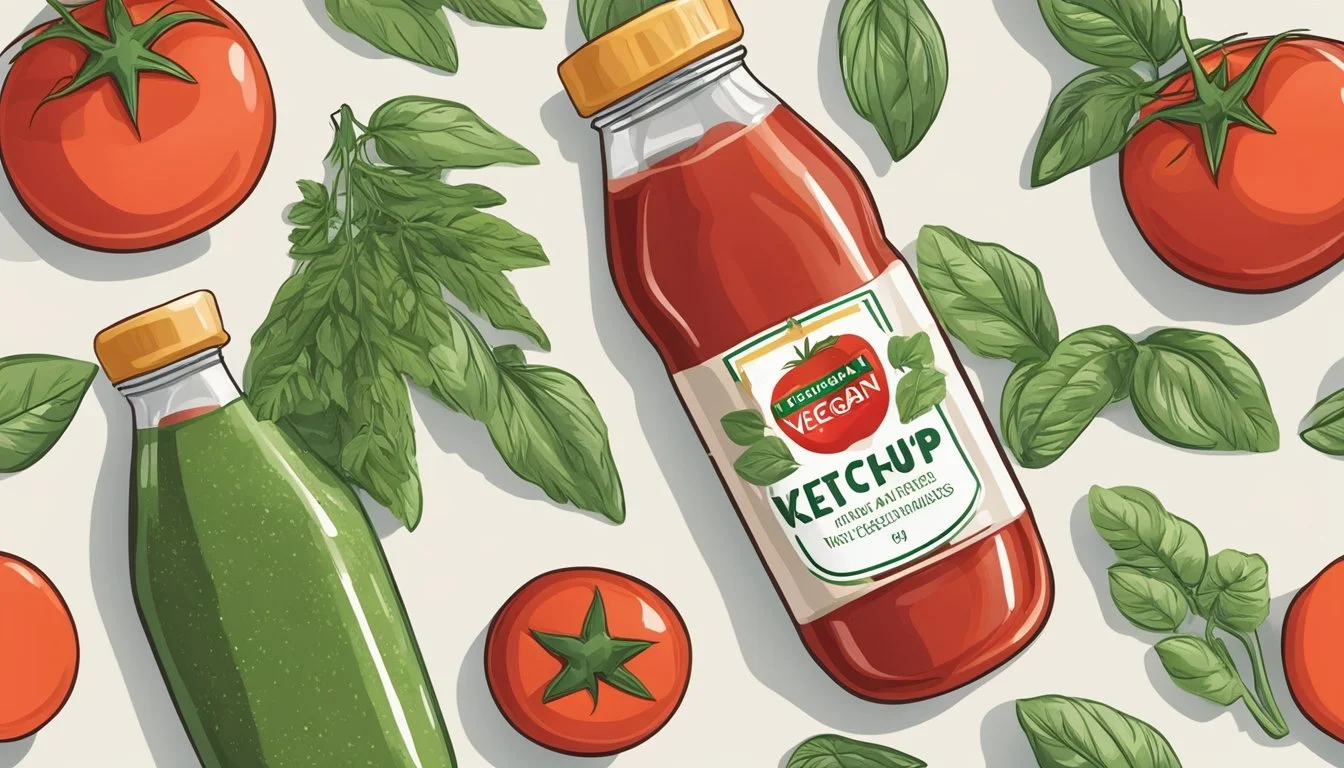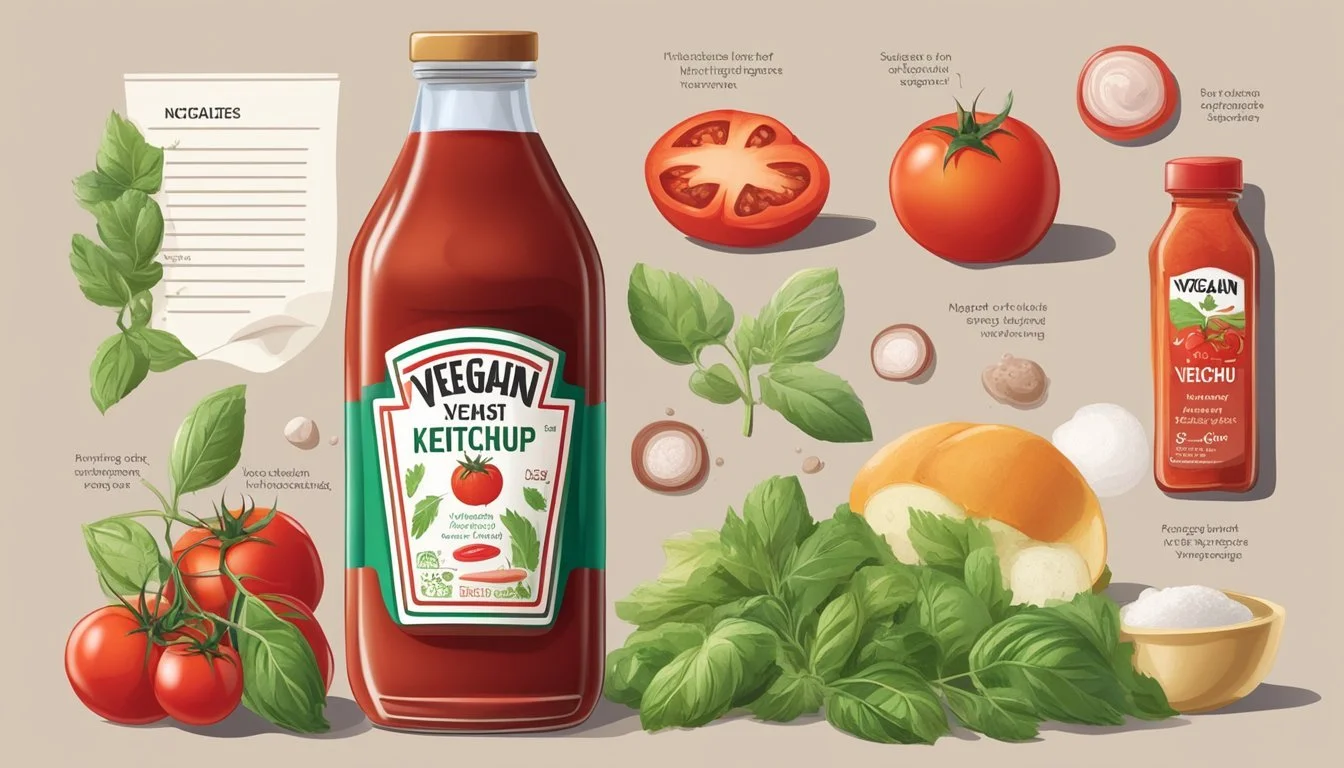Is Ketchup Vegan?
Unveiling the Truth About Your Favorite Condiment
When exploring the wide array of condiments available to enhance the flavors of our meals, ketchup often stands as a staple. Its tangy sweetness pairs well with everything from fries to burgers, and for those following a vegan lifestyle, the question of whether ketchup aligns with plant-based values is pertinent. Generally, ketchup is made from tomatoes (What wine goes well with tomatoes?), vinegar, sugar, salt, and an assortment of spices and flavorings. These ingredients are typically plant-based, suggesting that ketchup is vegan-friendly.
However, the devil is in the details, as the vegan status of ketchup can be more complex than it appears at first glance. Among the issues at play is the source of the sugar used in ketchup. If the refining process of sugar involves bone char—a product derived from animal bones—it may not be considered vegan. High fructose corn syrup, another common sweetener found in some ketchup brands, is always vegan as it is made from corn. It is also important to check for certifications, as organic ketchup brands that use sugar will often have organic certifications to guarantee the absence of animal-derived processing aids.
An added layer of consideration is cross-contamination, which could occur if the ketchup is produced in a facility that also processes non-vegan items. While this does not affect the ingredients themselves, some vegans might opt to avoid products with potential cross-contamination. Therefore, it is crucial for consumers seeking vegan ketchup to examine labels closely and choose brands that align with their specific dietary standards.
Understanding Veganism
Veganism is a dietary and lifestyle choice that involves abstaining from all animal products and by-products. It extends beyond diet to exclude the use of animal-derived goods such as leather, wool, and silk. Vegans aim to minimize the exploitation and cruelty to animals for food, clothing, or any other purpose.
Plant-Based Diet: While the term 'plant-based' often intersects with veganism, it primarily focuses on the nutritional aspect, emphasizing consumption of whole, plant-derived foods and limiting processed items.
Vegans vs Vegetarians:
Vegans: Consume no animal products whatsoever, including dairy, eggs, honey, and gelatin.
Vegetarians: Typically avoid meat but may consume dairy products, eggs, and other animal derivatives.
Diet Type Animal Meat Dairy Eggs Honey Gelatin Vegan No No No No No Vegetarian No Yes Yes Varies No
A vegan diet provides all the necessary nutrients through fruits, vegetables, grains, legumes, nuts, and seeds. There are multiple motivations for adopting a vegan lifestyle that may include health concerns, environmental factors, and ethical reasons. The plant-based diet has been noted for its potential health benefits, including lower risks of heart disease, high blood pressure, type 2 diabetes, and certain types of cancer.
When considering the adoption of a plant-based diet or vegan lifestyle, individuals must understand nutrient sourcing, ensuring adequate intakes of protein, iron, calcium, vitamin B12, and omega-3 fatty acids, which may require careful planning or supplementation.
Overview of Ketchup
Ketchup is a staple condiment found in most households and restaurants, known for its tangy and slightly sweet flavor profile. The primary ingredient is tomato paste, which gives ketchup its characteristic deep red color and rich tomato base. The paste is made by cooking down tomatoes to remove much of the water content and concentrate the flavor.
To achieve its unique taste, ketchup includes vinegar, typically distilled or cider, which adds acidity and brightness to the sauce. Sugar is another key component, lending a sweet counterpoint to the vinegar's sharpness. While sugar can come from various sources, it is essential for those following a vegan diet to note that some sugars may be processed with bone char, a non-vegan substance.
Salt is used to enhance the flavors and help preserve the ketchup, while a specific blend of spices—which can include anything from onion and garlic powder to allspice and cinnamon—provides depth and complexity. Lastly, water is added during the manufacturing process to achieve the desired consistency.
Here is a basic breakdown of ketchup ingredients:
Ingredient Purpose Tomato Paste Base and color Vinegar Acidity Sugar Sweetness Salt Flavor enhancement and preservation Spices Complexity and depth of flavor Water Desired consistency
The composition of ketchup can vary among brands and recipes, but the core ingredients remain consistent. While most commercially available ketchups are vegan-friendly, it's always prudent for consumers to review the ingredient list to ensure all components align with vegan standards.
Key Ingredients Analysis
The vegan status of ketchup hinges on its individual ingredients and their production processes. This analysis will clarify the common components and considerations for each.
Tomatoes
Tomatoes are the cornerstone of ketchup, providing the base and main flavor. They are inherently vegan, coming directly from the plant with no animal involvement.
Sweeteners
Ketchup often contains sweeteners like sugar or high fructose corn syrup. While these are plant-derived, some sugars may be processed with bone char, a non-vegan filter. Consumers seeking vegan ketchup should verify that brands use unrefined sugars or alternatives not processed with bone char.
Vinegar
Vinegar, a key preservative in ketchup, is usually vegan as it is produced from the fermentation of plant sources like apples or grapes. Distilled vinegars are typically vegan-friendly, but certain types of vinegar may involve non-vegan clarification processes.
Spices and Flavorings
Common seasonings in ketchup include salt, onion powder, and garlic powder. These are vegan. However, ketchup may contain "natural flavors," which can be ambiguous. Vegan consumers should seek clarity on the source of these flavors from the manufacturer.
Additives
Additives in ketchup may range from thickeners to preservatives. Xanthan gum, a common thickener, is typically vegan. Preservatives used in ketchup, like citric acid, are also generally vegan-safe. However, checking labels is crucial as formulations can vary.
Sugar and Vegan Concerns
In examining whether ketchup is vegan, the type of sweetener used is pivotal. Sugar, in its various forms, can be a point of contention due to processing methods that may not align with vegan standards.
Refined Sugar
Refined sugar, including white sugar and brown sugar, is commonly used in ketchup products. It originates from two primary sources: sugar cane and sugar beets. While the final product appears identical, the refining process for sugar cane often involves a decolorizing filter using bone char, derived from animal bones, which is a non-vegan additive. In contrast, sugar obtained from sugar beets does not require this step and is considered vegan.
Bone Char Filter Process
During the sugar refining process, particularly with cane sugar, bone char acts as a decolorizer to produce the pure white color of granulated sugar. Many vegans reject sugar processed in this way; thus, its presence in ketchup can be of concern. Labels do not typically disclose this detail, making it challenging to determine the vegan status based on sugar content alone.
Vegan Sweetener Alternatives
Organic granulated white sugar and confectioners’ sugar can be vegan-friendly options, as these do not undergo the bone char filtering process. Other vegan sweetener alternatives include:
High fructose corn syrup: A common sweetener in food products, including some ketchup brands, and it is vegan.
Beet sugar: Naturally vegan as it does not require bone char filtration.
Agave syrup, maple syrup, and molasses: Plant-derived sweeteners that serve as vegan substitutes.
Organic sugars: Like organic cane sugar, which is processed without bone char, providing assurance for vegan consumers.
Products such as Heinz Ketchup, particularly the original variety that uses high fructose corn syrup, are generally regarded as vegan-friendly. However, some sugar-sweetened non-organic varieties may pose a vegan concern.
Common Non-Vegan Additives
While ketchup is primarily made from tomatoes, vinegar, and a variety of spices, certain brands may include additives that are not vegan-friendly. Attentive consumers may find some of these non-vegan ingredients in commercial ketchup products:
Sugar: Not all sugar is processed equally. Some sugar is whitened using bone char, which is derived from animal bones. Vegans should look for ketchup brands that use organic or unrefined sugar to avoid this issue.
Honey: A sweetener produced by bees, honey is occasionally used in ketchup recipes. Since honey is an animal product, it is not considered vegan.
It is important to note that other condiments may occasionally include items like dairy products, eggs, or substances derived from egg whites, which some manufacturers use to alter the condiment’s texture. However, these ingredients are traditionally not found in ketchup.
Ketchup does not typically contain oysters or mussels, which are sometimes found in other sauces like Worcestershire sauce, making most ketchup options suitable for a vegetarian diet, if not always for a vegan one.
Individuals should review the ingredient list of their chosen ketchup brand to ensure it aligns with their dietary principles. Brands catering to vegan consumers may label their products as such, simplifying the selection process.
Analyzing Labels for Vegan Ketchup
When selecting a vegan ketchup, examining the label is crucial. Ingredients should be the first check. Traditional ketchup is generally made from tomatoes, vinegar, sugar, and spices. For it to be vegan-friendly, all these ingredients must be plant-based.
Non-vegan ingredients to watch out for include:
Honey - used as a sweetener in some recipes.
Certain sugar - processed with bone char from animals.
Controversial ingredients might be:
"Natural flavorings" - vague term which can sometimes include animal derivatives.
High fructose corn syrup - often considered less desirable due to production methods.
Labels indicating certified organic can be a positive sign, as organic sugars are less likely to be processed with bone char. However, certifications like "USDA Organic" or the "Vegan Society" are definitive evidence of vegan practices.
Here's how to dissect a ketchup label for vegan verification:
Identify the Ingredients: Look for plant-based items exclusively.
Check for Certifications: Organic and explicit vegan labels add veracity.
Confirm the Sugar Source: If sugar is an ingredient, ensure it's not processed with bone char.
Investigate Natural Flavorings: If listed, contact the manufacturer for clarification on the source.
A straightforward table for reference:
Ingredient/Criteria Vegan-Friendly? Notes Tomato, Vinegar, Spices Yes Standard in all ketchup. Sugar Maybe Must confirm non-bone char processing. Natural Flavorings Maybe Requires further investigation. Honey No Animal-derived and not vegan. Certified Organic Label Likely Organic standards usually mean no bone char sugar. Vegan Certification Yes Explicit assurance of vegan compliance.
Consumers should remain vigilant and inquire with manufacturers when ambiguity arises.
Popular Ketchup Brands Review
When exploring the range of vegan ketchup options, it's informative to look at specific brands and their products to determine their vegan status. This section offers a concise examination of popular ketchup brands, spotlighting both mainstream and niche selections.
Heinz Tomato Ketchup
Heinz is a dominant player in the ketchup market, and its Heinz Tomato Ketchup is widely regarded as vegan-friendly. Heinz offers a variety of ketchup products including the Heinz Organic Tomato Ketchup, which is also suitable for vegans. Their traditional ketchup is made with simple ingredients like tomato concentrate, distilled vinegar, and sugar without animal products.
Vegan Status: Vegan-friendly
Noteworthy: Heinz Organic Tomato Ketchup uses organic ingredients
Organic and Vegan Ketchup Brands
Several brands specialize in producing organic ketchup with an assurance of vegan suitability. Annie’s Naturals Organic Ketchup and 365 Everyday Value Organic Tomato Ketchup are notable for using organic ingredients that comply with vegan standards. Primal Kitchen makes an Organic Unsweetened Ketchup that avoids sweeteners altogether, catering to those seeking a sugar-free option.
Annie’s Naturals - Organic and vegan
365 Everyday Value - A Whole Foods Market brand offering organic, vegan ketchup
Primal Kitchen Organic Unsweetened Ketchup - No added sweeteners, vegan-friendly
Fast Food and Restaurant Ketchup
Navigating ketchup choices in fast food chains and restaurants can be challenging. However, many popular chains such as McDonald's and Subway provide vegan-friendly ketchup options. It is advisable for concerned vegans to inquire about the ketchup brands used by restaurants to ensure they avoid ingredients like sugar processed with bone char.
Common Brands: Heinz, Del Monte
Consumer Tip: Always ask if the ketchup has vegan credentials if unsure
It should be noted that while most ketchup is vegan by default due to its base ingredients of tomatoes, vinegar, and sugar (sometimes beet sugar or maple syrup instead of processed sugar), the concern for vegans may lie in the type of sugar used and whether it was processed using bone char. Overall, there are ample choices for vegan-friendly ketchup on the market, whether purchasing for home use or dining out.
Making Homemade Vegan Ketchup
Creating vegan ketchup at home is a straightforward process offering control over ingredients, particularly for those avoiding animal products and refined sugars. A basic recipe involves simple components like tomato paste, a sweetener such as date paste or maple syrup, and apple cider vinegar. Here's how to make a delicious batch of homemade vegan ketchup:
Ingredients:
1 cup tomato paste
4 tablespoons maple syrup or date paste
2 tablespoons apple cider vinegar
1 teaspoon garlic powder
1 teaspoon onion powder
¼ teaspoon salt (or to taste)
Directions:
In a saucepan, combine the tomato paste, sweetener of choice, and apple cider vinegar.
Stir in the garlic powder, onion powder, and salt.
Cook the mixture over medium heat for at least 5 minutes, allowing the spices to fully release their flavors.
Once the mixture begins to boil, reduce the heat to avoid splattering. Simmer until the ketchup thickens to the desired consistency.
Allow the ketchup to cool before transferring it to an airtight container for storage.
Homemade ketchup is a dairy-free condiment, making it a perfect addition to a vegan diet. The sweetener can be adjusted to personal dietary requirements; maple syrup is an excellent substitute for refined sugars. Cooking is an essential step to enhance the depth and meld the flavors. This simple recipe can yield a rich and bold ketchup that can be enjoyed with various dishes.
Storage and Shelf Life
When it comes to storing ketchup, one can confidently assert that its naturally acidic composition lends itself to a stable shelf life. Prior to opening, ketchup can be stored at room temperature without concern.
Unopened Ketchup:
Room temperature: safe until the expiration date.
Cool, dark place: recommended to maintain quality.
Once the bottle is opened, the storage dynamic changes. Refrigeration is not strictly necessary but is advised to extend the quality and taste of the condiment.
Opened Ketchup:
Refrigerator: Keeps it good for up to six months.
Room temperature: Can reduce shelf life due to exposure to heat and light.
Tips for Extended Shelf Life:
Keep the cap tightly sealed.
Avoid direct exposure to light.
Store in a consistent, cool temperature.
It's important to take note that changes in color, smell, or taste can indicate that the ketchup is no longer at its best quality, thus serving as a precise guideline for when to discard it. Operators and consumers should adhere to these guidelines to ensure the ketchup remains in an optimal condition for consumption.
The Environmental and Ethical Impact of Ketchup
The production of ketchup has notable environmental impacts due to the agricultural practices involved in growing its primary ingredients like tomatoes. The use of pesticides and fertilizers in non-organic farming can lead to soil degradation, water contamination, and biodiversity loss. Conversely, ketchup made from certified organic tomatoes ensures more environmentally friendly farming methods, although the larger ecological footprint from transportation and packaging still remains a consideration.
In terms of ethical considerations, conventional ketchup brands may use sugar processed with bone char, a product derived from animals. This poses a concern for those on plant-based diets as it conflicts with vegan principles which oppose the use of animal products. Consumers seeking vegan options can opt for brands using alternative sweeteners like high fructose corn syrup or organic sugar not processed with bone char.
Condiments, although a minor part of the diet compared to staple foods like meat, contribute to the food system's sustainability. Choosing plant-based and organically sourced ketchups aligns with the ethical standards of those minimizing their environmental impact and supporting humane practices.
Here is a table outlining the aspects of ketchup's impact:
Aspect Impact Details Environmental Potential soil and water issues from non-organic farming Ethical Use of bone char in sugar refinement; animal welfare concerns Plant-based Diet Support Availability of vegan-friendly, organic options Overall Contribution Secondary yet significant role in ethical consumption
This section reflects how ketchup, the seemingly simple condiment, carries a broader significance when scrutinized through an environmental and ethical lens.







